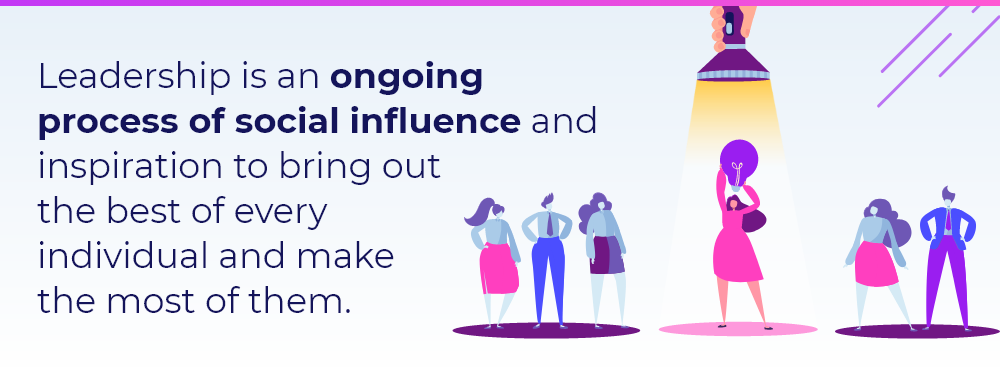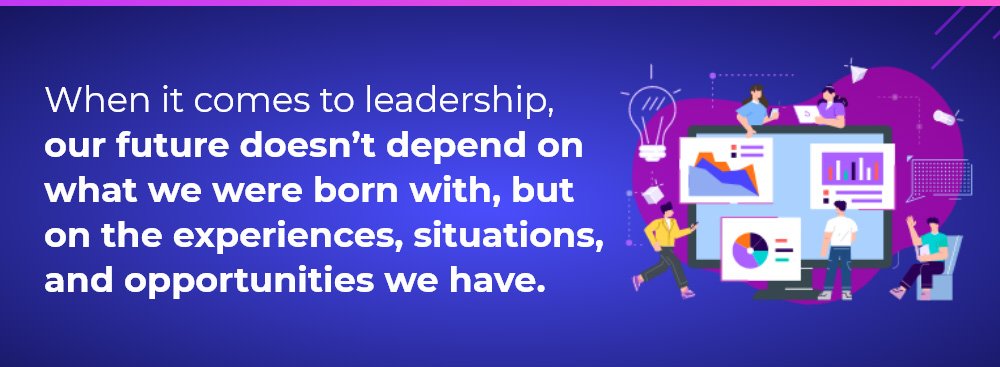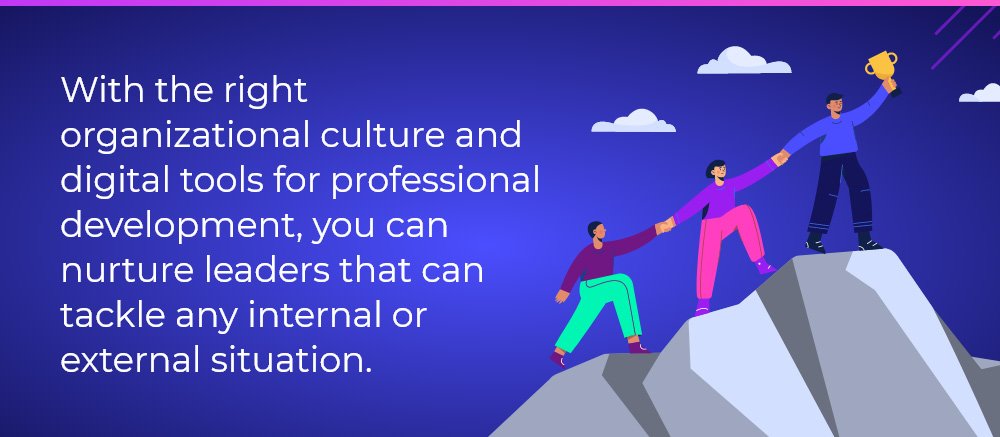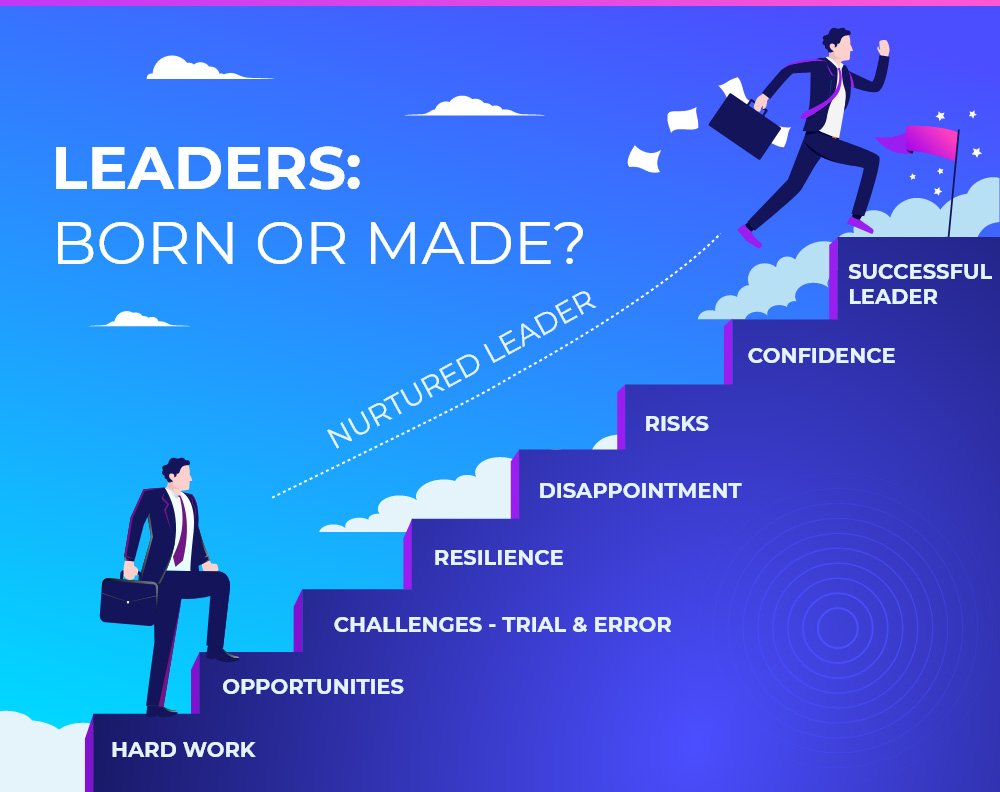Are leaders born or made? The Nature Vs Nurture Dilemma
Written by María Eugenia Raffaele
Here’s a common casualty dilemma in the world of business: Are leaders born or made – or both? Although some people are born with certain traits that make them better suited to leadership, everyone can become one – but how?
More than once, I bet you’ve heard people say “Oh, this person is a natural born leader”. Well, if you are a “nature over nurture” kind of thinker, you might believe there are certain personality traits that make people naturally predisposed to be leaders. If this is so, organizations like Google or Apple, which spend millions of dollars a year in leadership development are wrong. But are they?
Although it is true that some people do have a sort of “leadership spark”, prone to be quick problem-solvers, accurate decision-makers, influential, inspiring and charismatic, I believe leadership is not a science, but an art – and as such, it can be refined and perfected over time. As long as people are in the right place at the right time (your organization today), anyone can develop and cultivate the necessary skills to become a leader. So, are leaders born or made? it all depends on the opportunities the context offers to them.
What leadership is NOT
If you ever find yourself in this “nature vs nurture” dilemma on whether or not only certain people are born to be leaders, I suggest you define leadership in the first place. This is what leadership is NOT: It’s got nothing to do with one’s age, seniority, or the position in the hierarchy of the company, and you certainly don’t become a leader just because you are given that role. Leadership is an ongoing process of social influence and inspiration to bring out the best of every individual and make the most of them. As any process it is nurtured through hard effort, determination, confidence, trial and error, and, above all, experience.

Nature or Nurture? Breaking Down the Dilemma
To cast some light on the subject, let’s look at things from both perspectives:
SIDE 1 – Leaders: born, not made
Trait Theories support that leadership is born. They believe people are born with traits such as communicative skills and charisma to influence, inspire, effectively manage and lead groups of people to achieve collective goals and follow their vision.
So if there is a certain inborn predisposition in some individual’s personality to be leaders, what about the rest? Does leadership come in only one possible shape or size? What about our ability as human beings to learn, evolve and develop over time?
SIDE 2 – Leaders aren’t born, they are made
The Behavioral Theory, however, believes leadership is made, not born. Depending on each individual, it may take more or less time to master leadership, but the truth is that over time, with experience, ongoing learning, courage, willingness and practice, anyone can acquire the necessary skills to become one.

Leadership today
As the market evolves so does leadership. The world nowadays is way too dynamic to think that people can be “born” with a capacity to lead, so the question “are leaders born or made?” seems to be out of date when it comes to leadership. The traits of good leaders today have varied from the ones they had decades ago because the world has changed. Suppose your company has stayed in the market for quite a long time already, do your outstanding leaders back in the 2000s continue keeping up with leadership demands today? How do they cope with their remote teams? What about situations of crisis, or the soft skills required to keep employees engaged and supported?
In order to answer the born or made dilemma, we should shift the focus of the discussion and other than the leader, we should examine the contexts in which leaders are made.
So How are Leaders Made?

If you still think that great leaders are born, not made, go back in time and think about the leaders who made history, and you will notice they share common characteristics that not only made them unique, but also helped them introduce innovative ideas and change the world. Were they born leaders? No, the different contexts and challenges they faced, and the opportunities they had made them develop skills and habits that turned them into inspiring examples of leadership.
From Nelson Mandela to Kamala Harris, Elon Musk, Steve Jobs, or Melinda Gates (the list of inspiring leaders is endless) we can see one common characteristic: They set out to make a difference, not to be a leader. On the way, they found powerful resistance, and had to make a great effort to continue creating and innovating with bold courage no matter the circumstances. All of them made lots of mistakes and faced disappointment more than once, but they stayed confident, committed and flexible enough to change direction when needed.
And How are Leaders Made in Organizations?
The external and internal situations that affect your organization will have an impact on the types of leaders you have. Think about the initial question: are leaders born or made? If you are a nature sort of thinker, the belief that leadership is an innate skill that some people have and others don’t, will prevent you from discovering promising talent that can make a difference in your company as leaders. If you are a nurture thinker, however, bear in mind that with the right organizational culture and digital tools for professional development, you can nurture leaders that can tackle any internal or external situation – from attrition to an unexpected global crisis – successfully.
So what can you do to nurture your leaders?

- Build a digital corporate culturethat encourages and empowers leadership across the organization. (Do you know the types of leaders you want to nurture? What characteristics do you want and need them to have today?)
- Provide opportunities for professional development (although many people may already have certain leadership traits, make sure you provide them with enough training on the value of face-to-face communication, or what types of messages need to be one-on-one, for instance)
- Encourage creativity and self-expression in your teams to spot skills that can make them great leaders (What if the introvert who barely participates in meetings is given a voice and he/she is a great listener and super creative? You surely don’t want to miss that)
- Encourage active participation in transformations, changes and new challenges. The key aim of our brain is survival and it’s our protective mechanisms that keep us alive and get us where we are today. In this rapid and highly volatile business world, organization’s continuity depends on how well they develop new adaptation skills in their employees. So, new challenges can bring out leadership skills your people didn’t even know existed within them!
- Make the invisible visible. If you support the idea that leadership is made, not born, you need to have visibility of your company’s dynamics in order to spot the talent that can best shape the future of your company and nurture leadership in them. Digital solutions like StarMeUp, for instance, allow companies to accelerate career growth and team performance: Not only does it make a remarkably positive impact on your corporate culture at a human level, but also provides managers with valuable data insights to nurture leadership across the company.
So, are leaders born or made? The verdict
I believe these types of questions serve one purpose: To keep the debate alive so that we can continue listening to others’ views and opinions. I would conclude by saying that although there may be a small percentage of natural leaders with individual traits that can take them to leadership positions, there’s no single right way to lead, and no one-size-fits-all formula for the role. So, can leadership be learned? Absolutely yes. How? Simply by being made! The right context and opportunities can make great leaders.
You’re welcome to share your thoughts or doubts on this subject with us. We can help you build a culture that will nurture the best leaders for your company!